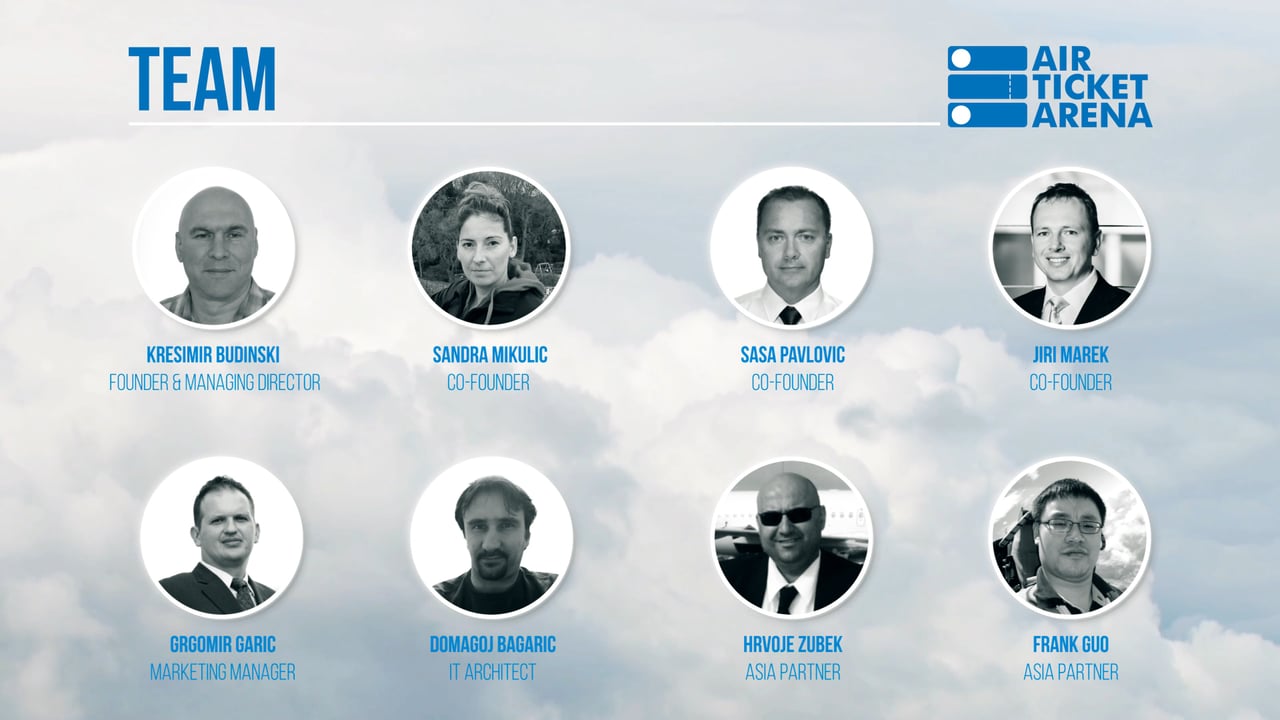Fundraising on Angel Investment Network – A User Story:
Kresimir Budinski first reached out to me through LinkedIn. He is the founder of Air Ticket Arena – the first fully-automated platform allowing passengers to bid for unsold seats on scheduled flights; and helping airlines to recuperate some of the £120 billion in lost sales each year through unsold seats.
He recently closed a £350,000 of seed fundraising through Angel Investment Network.
Kresimir, or ‘The Bishop’, as he is affectionately known by his team, complimented me on my article about SEIS & EIS Tax relief. He had apparently used it as an explainer throughout his fundraising. Both for investors he had found through Angel Investment Network and other channels.
I thanked him and wished him luck with the fundraising. And we left it at that.
Messages like this are relatively frequent (depending on the quality of my article!). So I didn’t think any more of it.
But I was to hear a lot more from Kresimir and the story behind his fundraising. A few months later, pleased with his progress (now overfunding), he shared his fundraising experiences with me in full. It struck such a chord that I had to share the story.
It’s a tale of how courage through scepticism can bring great opportunity. And it’s a useful case study for anyone considering looking for investors on the Angel Investment Network platform, and more importantly, for anyone fundraising in general.
So, in the charismatic words of their Head of Marketing Grgomir ‘George’ Garić, the story of Air Ticket Arena’s fundraising journey from intense initial scepticism to success….

Part 1: Fundraising Scepticism
I had always considered investors a type of mythical creature, living somewhere in a distant fantasy land, creasing themselves with derisive laughter at most investment proposals. By investors, I mean real investors who can offer advice as well as capital. Not just people who masquerade as investors because they have a bit of cash.
Of course, I had heard about the likes of Facebook, Uber, Airbnb, and hundreds of other projects backed by investors – but I had never met anyone who would actually boost my bank account.
Except for my wife, of course.
In my life before Air Ticket Arena, I had met many who claimed to be investors. But few of them understood the symbiosis required between entrepreneur and investor to make a partnership mutually motivating. The interaction between idea and capital needs to be good for both the idea and the capital. The idea needs to grow and so does the value of the capital.
Too many investors wanted to buy into projects at way below the value of the idea and all the preceding hard work. They refused to realise that this was not optimal for the business and therefore not optimal for their investment.
Given these early experiences with “investors”, my approach to any kind of investor was always going to be like visiting an 18th-century dentist. Suspicious in the extreme.
Part 2: Misplaced Hope
So, when I started working on Air Ticket Arena and Kresimir, suggested fundraising our seed round through Angel Investment Network. I thought it was the beginning of the end.
I sincerely believed that Angel Investment Network, despite their 13-year history and impressive track record, was just another portal where anyone – even my mother – could masquerade as an investor.
So why did we go with them?
Sometime in 2009, a seemingly beautiful thing happened. Kickstarter kickstarted. This was the first time I had heard about crowdfunding.
The theory seemed inspired to me. This was a real innovation in the investment scene which promised a more efficient process for both investors and entrepreneurs. And promised to harness the power of the crowd with all the social proof that can bring.
Then equity crowdfunding platforms like Crowdcube and Seedrs emerged. Icing on the cake. Or so I thought.

I had heard complaints about these platforms from founders who had tried them. But I dismissed them as over-fussy.
When Kresimir asked me to prepare a crowdfunding campaign on Crowdcube for Air Ticket Arena, it was a joyous occasion and I dove into the work with relish.
We prepared almost everything for the campaign and then one week before the launch, Crowdcube refused us. Their reason? We didn’t have a high street bank account. Right.
Not to be deterred, we immediately approached Seedrs hoping to re-purpose the material we had put so much effort into for the Crowdcube campaign. After a 15-minute call, they claimed that our valuation was too high to run.
My high hopes were thoroughly misplaced and I found myself floundering in a sense of gloom about the prospects of fundraising. Not simply for myself, but also for other regular people who do not have access to investors through their personal network.
It was in this state of despondency that Kresimir insisted we chance our hand on Angel Investment Network. You can imagine my reaction.
I already considered this platform inferior to the likes of Crowdcube and Seedrs who had just thoroughly disappointed me.
Thus, it was without much hope and intense reluctance that I agreed to create a pitch on Angel Investment network…
Part 3: Faith Rewarded
![]()
Six months later, we have raised £350,000 and filled our seed round. The strength of the discussions means that we are now overfunding as I write this.
At this point, while we enjoy the security of fundraising mission accomplished and while the experience is still fresh in our minds, I thought it might be helpful to share some key findings from our campaign on Angel Investment Network.
– Are the investors active and real?
Most of the investors we spoke to were active and engaged in the investment community and had the capital to invest. Even those investors who did not ultimately invest provided useful feedback for us with which we were able to improve our pitch and even our business. The platform also monitors the activity of investor users. Anyone suspicious is removed pending investigation.
– How can I tell if an investor is really interested?
It will be straightforward to identify investors who are seriously interested. They will have read your pitch in detail and will ask the most pertinent questions so will stand out from the others.
It is also very important to do your own due diligence of any investor contact – you can be sure they’ll be doing it on you. So, don’t be afraid to ask people to identify themselves if their profile is not clear.
– How can I keep prospective investors interested?
When you are happy that a prospective investor’s interest is genuine, engage in dialogue with them in a clear manner. Your job is to clarify what you have written in your deck. Keep focused on it. Try to also give the impression of progress and momentum – update investors you’ve not heard back from as well as ones you actively talking to.
– What should I say about valuation?
Avoid any talk about valuations after a one-minute talk or a first email response. Send an investment package and give them up to a week to investigate the opportunity. An excellent counter-question is to ask them how much they want to earn? None of them gave us an exact answer.
When you do come to declare your valuation make sure that your reasons for it are clear and grounded in the reality of the space in which you are operating.
– What sort of investors should I aim for?
Expect that your investors will more likely be from a similar industry to your project. If it is a project from the travel industry, then more than likely the investors will come from the travel industry. These investors will certainly be most helpful to you. However, there are many investors who are interested in investing in an area but are not necessarily experts e.g. Bankers interested in AI. So be prepared for this too.
– Do I need to have all the legal stuff prepared?
Make a clear legal pathway for investors who make you an offer of investment. Your investment contracts need to prepared and ready to send. An offer is never really finalised until all the forms are signed and the money is in your account, so you don’t want to have any delay in sending over the necessary documents when an investor declares an offer.
– How much effort is required?
Prepare to invest time and some money to ensure your pitch is as good as possible and that it gets the exposure it needs to raise the capital you need.
To be successful your pitch needs to be excellent and you need to market it well. We wrote 50+ articles explaining our concept from a variety of angles which we shared across social media channels. Angel Investment Network were very willing to re-share these posts which helped to create a buzz.
What I want people to understand from our story is that anyone with a good idea can raise money from angel investors. It requires dedication and hard work, but so does running a successful business!
At this point, on behalf of the whole team at Angel Investment Network, I’d like to thank Kresimir, George and the guys at Air Ticket Arena for taking the time to share this. All the best with the business!
Want to know more about Air Ticket Arena?
Check out their explainer video below:
Want to share your experience on Angel Investment Network and get featured as part of this user story series?
Please contact me on oliver@angelinvestmentnetwork.co.uk or on Twitter
Follow @Oliver_Jones7

